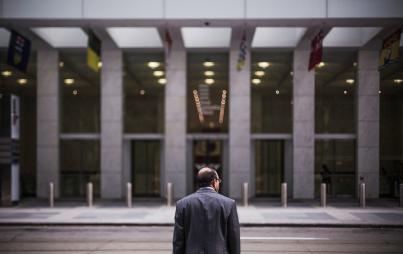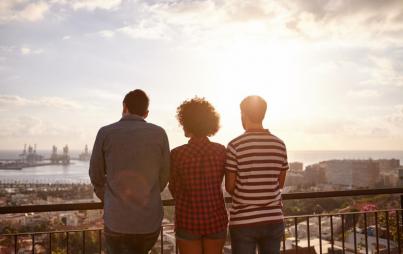
Just when you start to question that creeping feeling that Coca-Cola owns, like, every liquid everyone puts in their body from the banks of the Mississippi to the bowels of Bangladesh, the international juggernaut worth more than $74 billion (more than Budweiser, Pepsi, Starbucks and Red Bull combined) goes and confirms your every worst fear.
Those sweet bubbles coursing down your throat come at a high price.
A new study published by CIMI has revealed shocking new suicide statistics within a 46,000-person Brazilian tribe called the Guarani, which now has the highest suicide rate in the world. In 2013, 72 members took their own life, which equates to about 232 deaths per 100,000 people. Oh, and that figure has tripled in the last 20 years. (In comparison, South Korea—which has the highest suicide rate of any other country—comes in at a "mere" 24.7 per 100,000.)
What do Coca-Cola, an obscure Brazilian tribe and suicide stats have in common? So glad you asked.
The Blight of Bunge
It turns out that Coca-Cola is sourcing sugar from Bermudan agriculture giant Bunge—a heavy investor in Brazil's burgeoning biofuels industry—which in turn buys its sugar cane from ancestral land that's allegedly been stolen from the Guarani.
While Brazil's government has attempted to work hand-in-hand with the Guarani, going so far as to draft an agreement stating that the indigenous Guarani land will be protected and returned, nothing—shocker!—has actually been done and the tribe continues to wait while Bunge's sugarcane fields continue to grow, uninhibited.
Interestingly enough, the sugarcane crops are actually a relatively new venture for the ag juggernaut, which has traditionally functioned as a middleman, purchasing grain and other resources rather than growing the crops themselves. Apparently, sugar cane—used to create the low-carbon biofuel ethanol—has a much shorter shelf-life than soybeans or corn, so Bunge decided to process it themselves to guarantee a steady supply.
Sadly, Bunge is operating well within their legal rights, maintaining that the "the lands in question are still under adjudication by the Brazilian government . . . As of now, the Federal Government has not made a decision designating the lands as indigenous . . . as such, the company continues to honor legal contracts with growers, signed prior to our acquisition of the mill, to source sugarcane from these lands."
But as we all know all-too-well, the chasm between what's "legal" and "right" could swallow up the whole damn earth.
Arlindo, a tribe leader of the Guarani, has explained that Bunge's sugarcane presence has undermined their very way of life.
The ranchers have destroyed almost all our forest, our medicinal plants, our fruits and resources. They spray pesticides from planes. The children get headaches and start vomiting.
Oxfam also recently published a report—Nothing Sweet About It—which accused several big-name corporations (including Bunge and Coca-Cola) of myriad human rights violations through the practice of "land-grabbing" in the name of sugar production. Coca-Cola was at the top of their shit-list:
Take the 53 families who had been living on 17 islands in the Sirinhaém estuary in Brazil’s Pernambuco State. Since 1914 multiple generations of families grew crops, fished and collected shellfish to eat and sell. The families were evicted in 2002, after several decades of intermittent pressure from Usina Trapiche, a giant company which provides sugar to Coca-Cola and PepsiCo.
In 1998, members of the sugar company’s private militia destroyed the communities’ homes and farm land, burning down their houses and then, after they had been rebuilt, burning them down again. The community received death threats and feared for their safety.
Charming story, right? Sugar is grown on 31 million hectares of land globally (which is, in case you're wondering, about the size of Italy), and much of it was taken—by force—from poor communities to fuel our insatiable desire for sugar. Oh, and demand for sugar is poised to rise by 25% by 2020. As sugar plantations continue to sprawl across the continent, the Guarani (which are just one of many indigenous populations across the globe sacrificed on the sugar alter) are increasingly displaced. Their tribe is openly suffering at the hands of starvation and moral destitution; for many, suicide is welcome.
There’s no future, there’s no respect, there are no jobs and there is no land where we can plant and live. They choose to die because actually, they are already dead inside. —Guarani tribesman
But Wait! That's Not All!
More complicated still is the fact that Coca-Cola is one of the World Cup's biggest sponsors and has of course, directly contributed to the Guarani Indian's displacement and ever-growing protests (one of which occurred during the World Cup's opening ceremony and was, of course, largely ignored by the media covering it).

Squeezing hot lemon into the festering wound, Coca-Cola and FIFA designed an ad (on left) with a belly-laughing Indian man swilling the sweet soda captured, "Welcome to the World Cup for Everyone!" Survival International, a nonprofit dedicated to giving voice to indigenous populations, decided to create their own, inviting viewers to the "The Dark Side of Brazil."
Image: ThinkStock
If you're keen to learn more about the controversy and perhaps even sign a petition to urge Brazil's government to give back the not-yet-sugar-sullied land, you can do so here.






